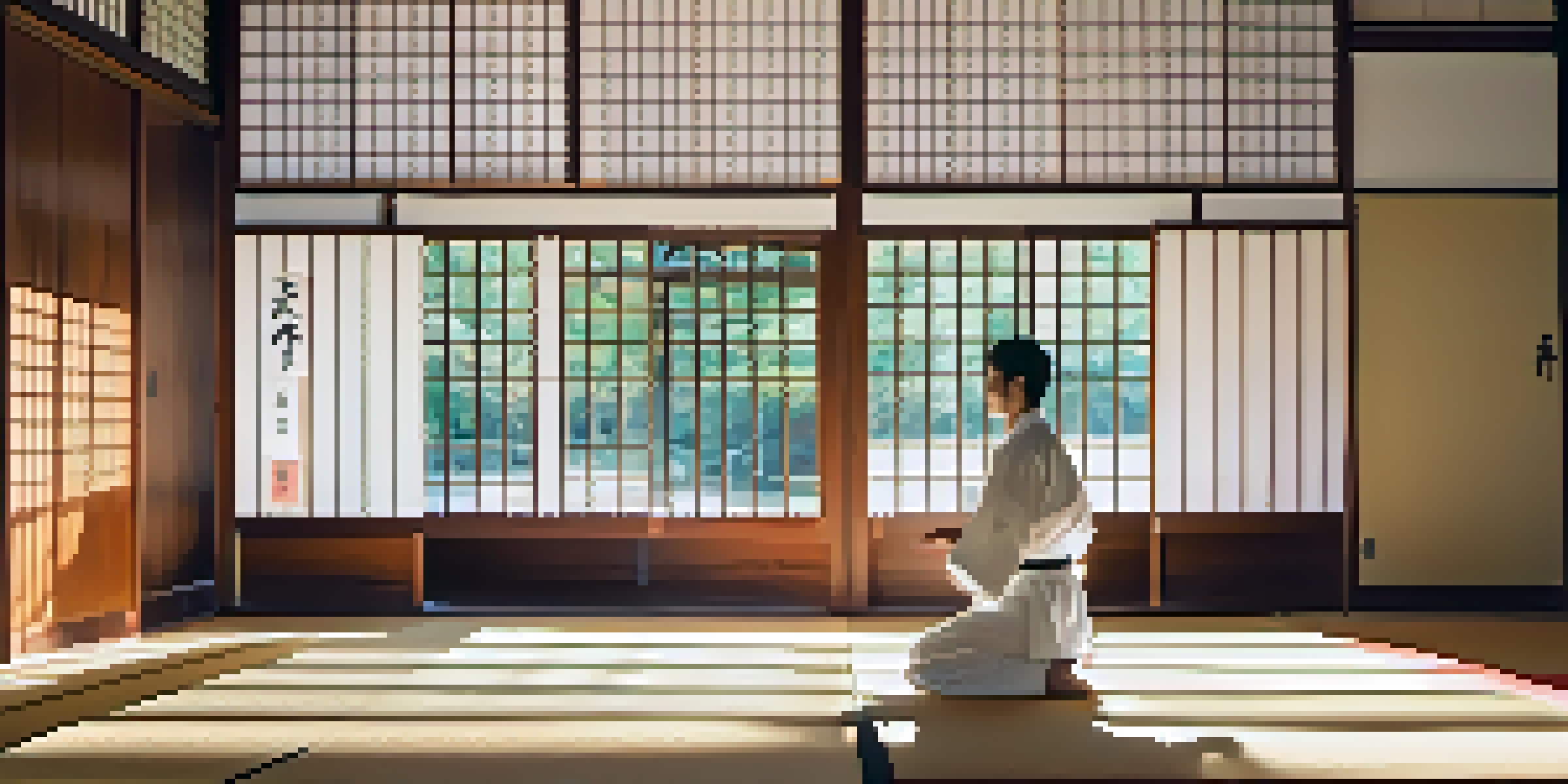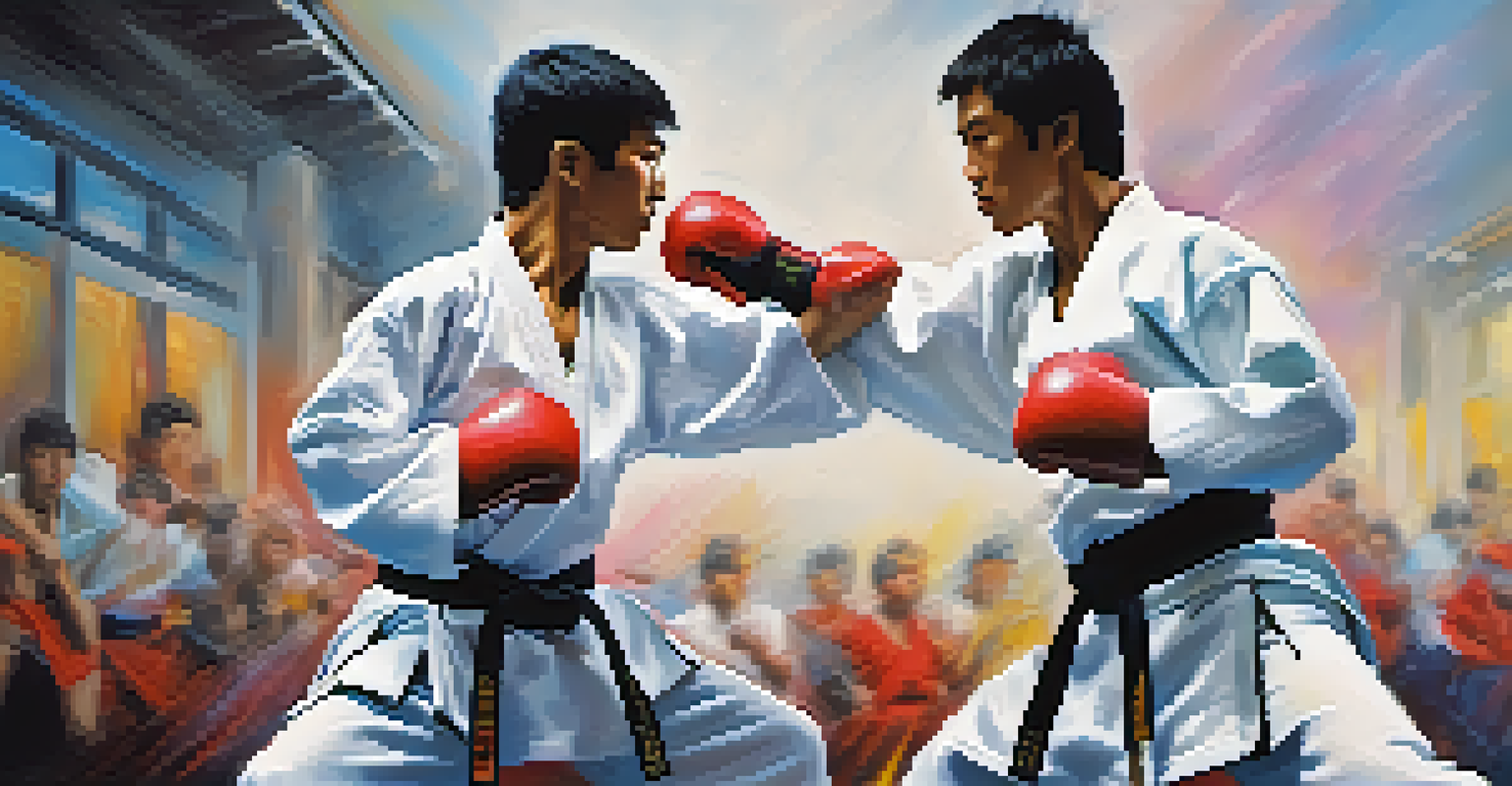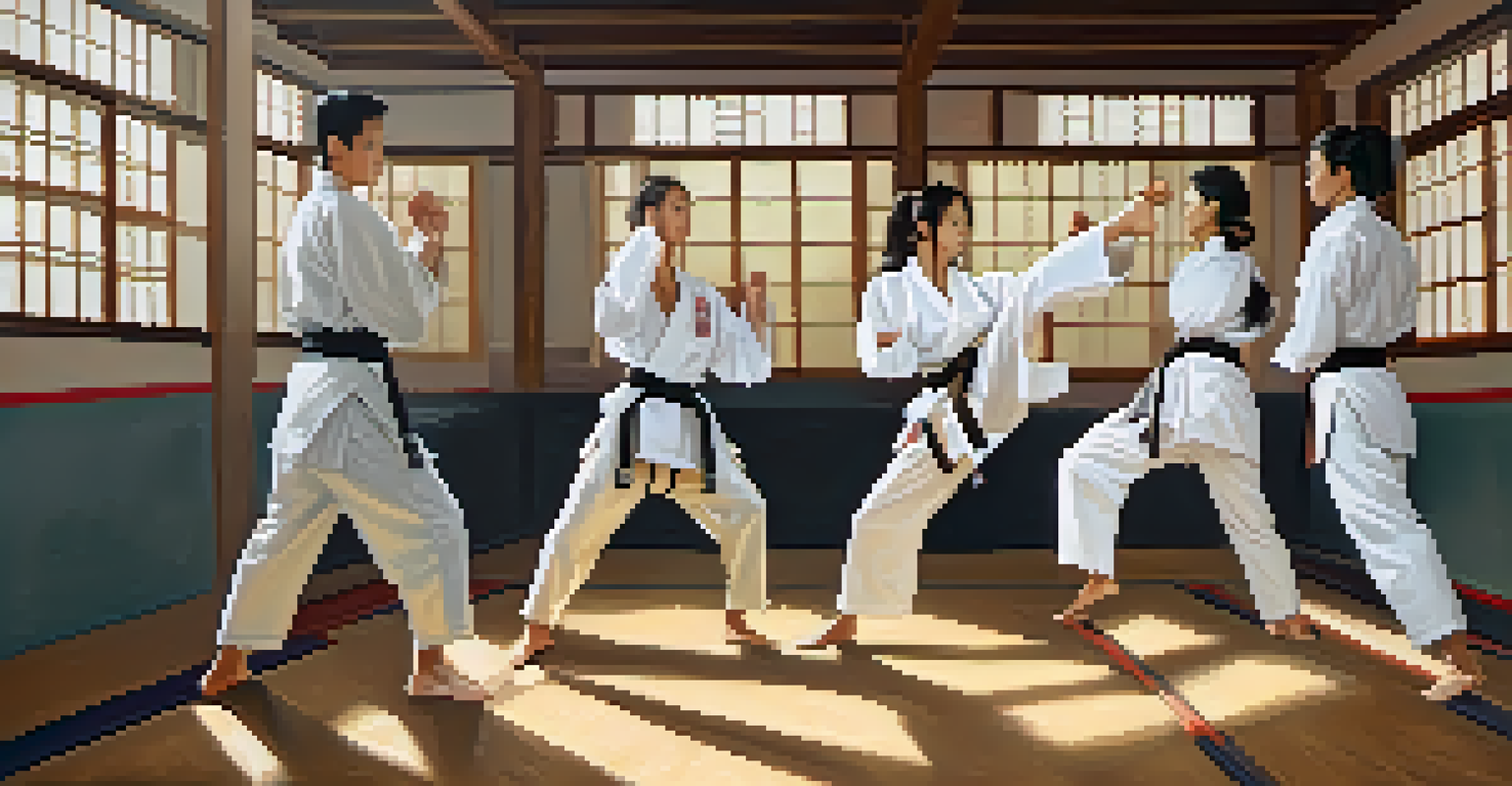Conflict Resolution Skills Gained from Martial Arts Training

Understanding Conflict Through Martial Arts Principles
Martial arts teaches practitioners to understand conflict at its core. It's not just about physical confrontation; it's about recognizing the underlying emotions and motivations of all parties involved. This understanding helps martial artists approach conflicts with empathy and insight, making it easier to find common ground.
The greatest victory is that which requires no battle.
For example, when a student faces a sparring partner, they learn to read their opponent's body language and intentions. This skill translates beyond the dojo, allowing individuals to assess situations in everyday life, leading to more effective conflict resolution. By grasping the nuances of conflict, martial artists can navigate disputes more thoughtfully.
Ultimately, this foundational principle of understanding opens the door to healthier communication. When you're aware of the factors driving a conflict, it's easier to address issues collaboratively rather than combatively.
Enhancing Emotional Regulation Through Training
One of the key benefits of martial arts training is the development of emotional regulation. Practitioners learn to control their emotions under pressure, which is crucial when facing conflicts. This skill enables individuals to remain calm and collected, even in heated situations, reducing the likelihood of escalation.

Take, for instance, a martial artist who faces an aggressive opponent. Their training teaches them to breathe deeply and focus, rather than react impulsively. This same approach can be applied during everyday disagreements, allowing for a more measured response that prioritizes resolution over confrontation.
Understanding Conflict with Empathy
Martial arts training helps practitioners recognize the emotions and motivations behind conflicts, promoting healthier communication.
By mastering emotional regulation, martial artists become adept at managing their responses. This self-control not only aids in personal conflicts but also inspires others to adopt a similar calm, fostering a more peaceful environment.
Improving Communication Skills Through Sparring
Sparring is not solely about physical combat; it's also a powerful tool for enhancing communication skills. During sparring sessions, martial artists must convey intentions clearly and respond to their partner's cues effectively. This practice sharpens their ability to express thoughts and feelings in real-life conflicts.
In the midst of chaos, there is also opportunity.
For example, a martial artist might use verbal cues during a sparring match to signal a change in intensity or technique. This kind of clear communication is essential in resolving misunderstandings in personal and professional settings. The ability to articulate needs and concerns leads to healthier dialogues.
By honing these communication skills on the mat, martial artists become better equipped to handle disagreements off the mat. They learn that open, respectful dialogue is key to reaching resolutions, making them more effective negotiators and peacemakers.
Cultivating Respect for Others in Martial Arts
Respect is a fundamental tenet of martial arts, emphasizing the importance of valuing others, regardless of differences. Practitioners are taught to honor their instructors, peers, and even opponents, fostering an environment where mutual respect thrives. This principle is crucial when navigating conflicts.
When martial artists approach disagreements with respect, they create a space for open dialogue and understanding. For instance, acknowledging another person's perspective can de-escalate tensions and pave the way for collaborative problem-solving. This respect helps build trust, making it easier to tackle disputes head-on.
Emotional Regulation Enhances Resolution
Training in martial arts equips individuals with the ability to manage their emotions under pressure, leading to more constructive conflict resolutions.
Ultimately, cultivating respect through martial arts training allows individuals to approach conflicts with a mindset geared toward resolution rather than hostility. It transforms confrontations into opportunities for growth and understanding.
Developing Problem-Solving Skills Through Strategy
Martial arts training emphasizes strategic thinking, teaching practitioners to analyze situations and devise effective solutions. This skill is invaluable when facing conflicts, where quick and thoughtful problem-solving can lead to positive outcomes. The ability to think critically under pressure is a hallmark of martial arts.
For example, during a competition, a martial artist must quickly assess their opponent's strengths and weaknesses to adjust their strategies accordingly. This adaptability also applies to resolving conflicts, where understanding the dynamic can lead to more effective solutions.
By embracing this strategic mindset, martial artists learn to approach conflicts with a solutions-oriented outlook. They become adept at identifying root causes and exploring various options, ultimately leading to resolutions that benefit all parties involved.
Building Confidence to Address Conflicts
Martial arts training instills a sense of confidence that empowers individuals to confront conflicts head-on. As practitioners gain skills and knowledge, they develop a belief in their ability to handle challenging situations. This confidence translates into everyday life, where addressing conflicts becomes less daunting.
Consider a martial artist who successfully defends against a challenging opponent. This victory boosts their self-esteem and reinforces the belief that they can tackle difficult conversations and disputes as well. When confidence is present, individuals are more likely to engage in constructive conflict resolution.
Applying Skills Beyond the Dojo
The conflict resolution skills gained from martial arts are applicable in daily life, empowering individuals to navigate challenges effectively.
By building confidence through martial arts, practitioners learn that facing conflicts is not something to fear but an opportunity for growth. This mindset encourages proactive engagement, leading to healthier relationships and improved outcomes.
Fostering Teamwork and Collaboration in Training
Many martial arts disciplines emphasize teamwork, whether through group classes or partner drills. This aspect of training fosters collaboration, teaching individuals how to work together toward common goals. These skills are essential when resolving conflicts, as teamwork often leads to more effective solutions.
For instance, in a paired drill, two martial artists must communicate and synchronize their movements to succeed. This collaboration mirrors the dynamics of conflict resolution, where parties must work together to find common ground and achieve mutual understanding.

By fostering teamwork during training, martial artists learn that collaboration can turn conflicts into opportunities for cooperation. This realization encourages a team-oriented approach to conflict resolution, promoting harmony and understanding.
Applying Martial Arts Conflict Resolution Skills in Daily Life
The skills gained from martial arts extend well beyond the dojo and can be applied to various aspects of life. From personal relationships to professional settings, the abilities to communicate, problem-solve, and regulate emotions are invaluable when navigating conflicts. Practitioners become equipped to handle challenges with confidence and poise.
For instance, a martial artist may find themselves in a disagreement at work. By utilizing their training, they can approach the situation calmly, communicate effectively, and seek collaborative solutions. This proactive approach can lead to more positive outcomes and strengthen relationships.
Ultimately, the conflict resolution skills gained from martial arts training empower individuals to navigate the complexities of life with grace. They become agents of change, fostering healthier interactions and contributing to a more peaceful environment, both on and off the mat.